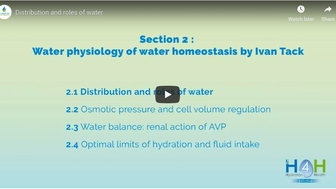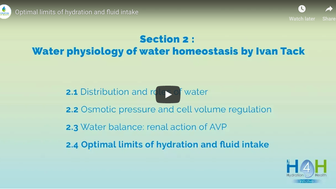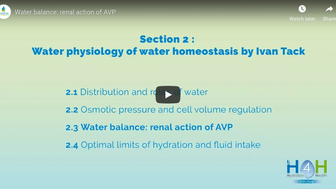Module 2: Water Physiology of Water Homeostasis
Water is the main component of human body. Maintenance of body water compartment distribution is critical for cell volume and function, nutritive and depurative actions of interstitial volume and adjustment of plasma volume, the main determinant of long term regulation of blood pressure. Water turn-over is variable, as both fluid intake and output may vary tenfold. Thus, maintenance of water balance relies on:
- Osmodetection,
- Regulation of Arginine Vasopressin (AVP) secretion that in turn modulates urine volume,
- Finally, adjustment of beverage intake under the control of thirst.
As the body is unable to store excess of water, the inability to save body water (by the kidney) or to replace it (by drinking) results in dehydration responsible for osmotic stress. Whereas water homeostasis is highly efficient to protect us against acute dehydration, little is known about the impact of daily water-saving in case of chronic low fluid intake (i.e. in low drinkers). Such a situation does not result in dehydration, but leads to mild but prolonged stimulation of AVP secretion and reduction of urine volume.
Prolonged renal water saving increases the risk of renal stone disease and, in women, the risk to develop recurrent urinary tract infection. Recently, epidemiological studies have linked both low fluid intake and low urine volume to the risk of chronic kidney disease. Prolonged antidiuresis resulting from increased plasma AVP concentration is common in humans. Since AVP is also a stress hormone, this raises the question of its long term impact. There is growing evidence for relationships between antidiuresis, AVP and the risk to develop type 2 diabetes or components of the metabolic syndrome. Medical knowledge in this field is only emerging. However, proofs of concept are already sufficient to encourage people to drink at least enough water to meet published dietary reference values.










